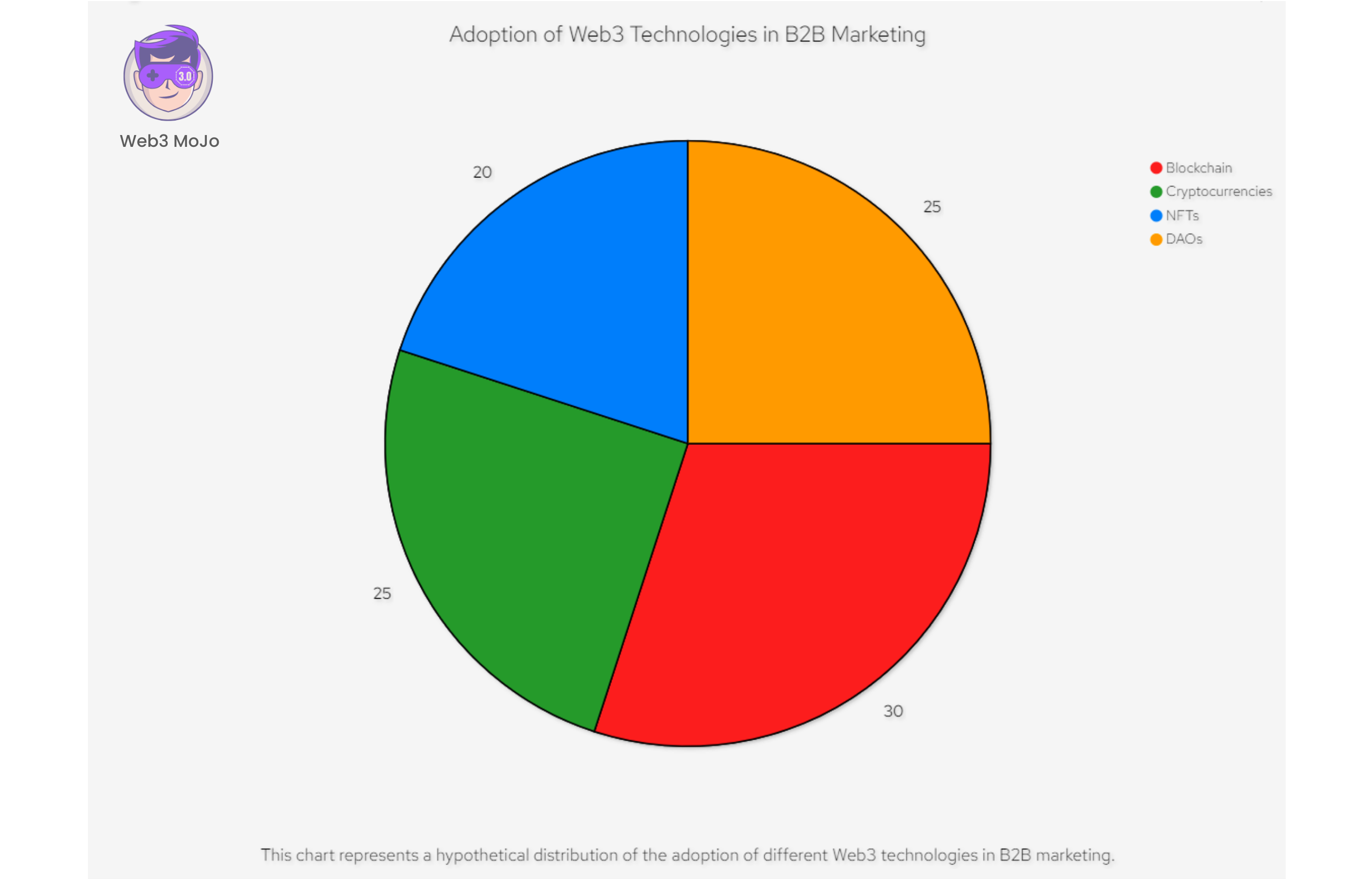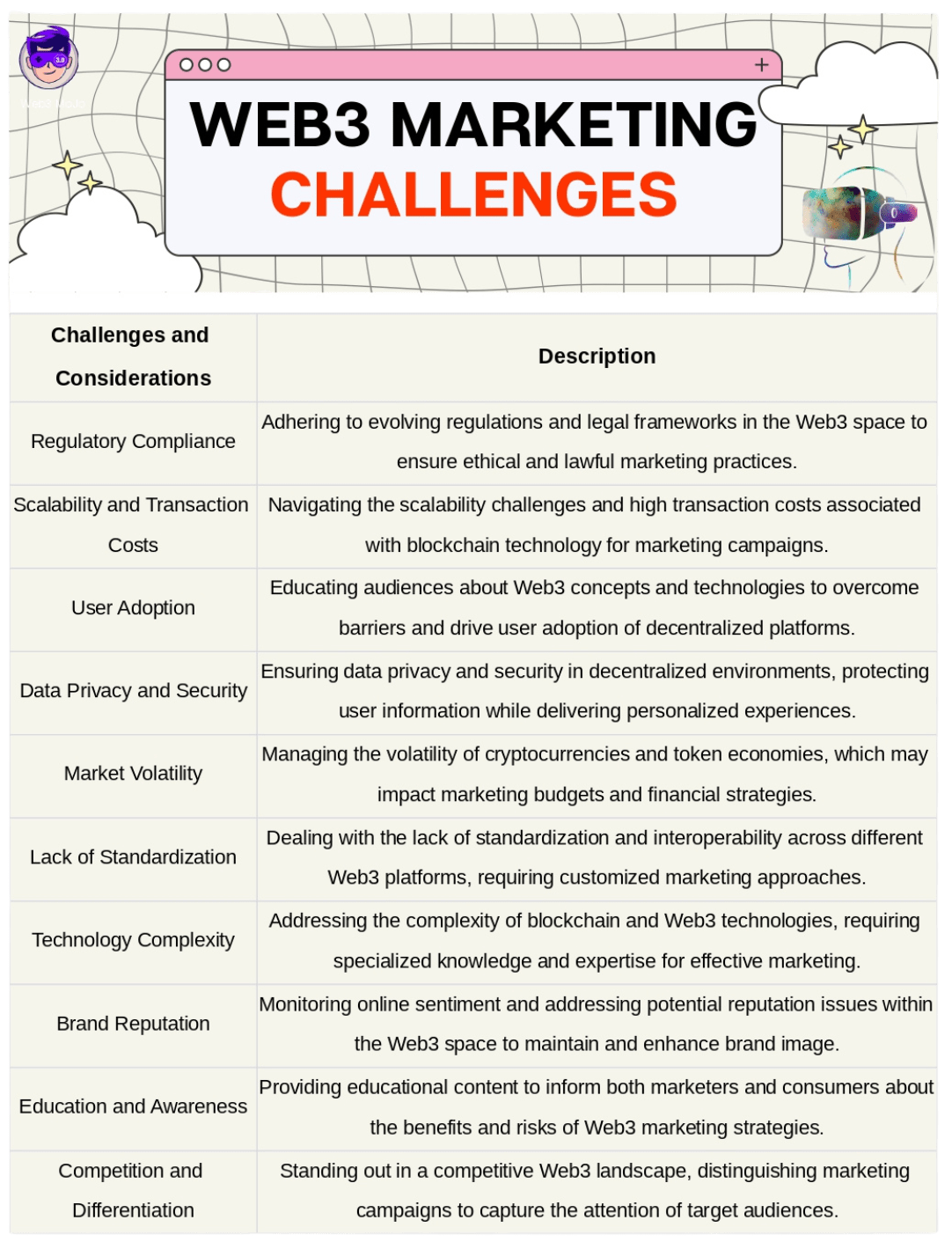I. Introduction
Here, we will explore the transformative potential of Web3 technologies and how they can be leveraged to create effective B2B marketing strategies. As the digital landscape continues to evolve, understanding and utilizing these technologies is becoming increasingly important for businesses looking to stay ahead of the curve.
Web3, or the decentralized web, represents the next stage in the evolution of the internet
We have already read about Web3 advertising with blockchain. Unlike Web2, which is dominated by centralized platforms like Google and Facebook, Web3 is built on blockchain technology, allowing for decentralized and transparent interactions. According to a report by Deloitte, 34% of companies already have a blockchain system in production today, demonstrating the growing relevance of Web3 technologies.
II. Understanding Web3 Technologies
A. Web3 technologies encompass a range of tools and platforms, including:
Blockchain: A decentralized ledger that records transactions across multiple computers. It’s the underlying technology for cryptocurrencies and provides a high level of transparency and security. – Cryptocurrencies: Digital or virtual currencies that use cryptography for security. By the end of 2023, the global cryptocurrency market value will be over $2 trillion.
NFTs (Non-Fungible Tokens): Unique digital assets that represent ownership of a specific item or piece of content on the blockchain. The NFT market experienced explosive growth in 2021, with sales reaching $2.5 billion in the first half of the year.
DAOs (Decentralized Autonomous Organizations): Organizations represented by rules encoded as a computer program that is transparent, controlled by the organization members and not influenced by a central government. DAOs have gained significant attention after the rise of the Ethereum blockchain.
B. The shift from Web2 to Web3 is a significant one.
Web2 is characterized by the dominance of a few centralized platforms that control data and information flow. In contrast, Web3 is a decentralized and democratic model where users have control over their own data. This shift is being driven by increasing concerns over data privacy and the monopolistic power of tech giants. According to a PwC report, 86% of consumers are concerned about their data privacy, indicating a growing demand for the transparency and user control offered by Web3 technologies.
Below is a diagram illustrating the shift from Web2 to Web3 and the various technologies associated with Web3:
III. The Impact of Web3 on B2B Marketing
A. Web3 is fundamentally changing the B2B marketing landscape by introducing new ways to build trust, engage customers, and streamline transactions. With blockchain’s transparency, businesses can demonstrate their commitment to ethical practices, a factor that 66% of global consumers say is important to them according to a Nielsen report. Cryptocurrencies and smart contracts can simplify transactions, especially for international businesses, by reducing costs and eliminating intermediaries. NFTs and DAOs offer unique opportunities for customer engagement and collaboration.
B. Several companies are already successfully using Web3 technologies in their marketing strategies. For instance, IBM has been a pioneer in using blockchain for supply chain transparency, enhancing their B2B relationships. Microsoft, on the other hand, has been using the Ethereum blockchain to build decentralized identity systems, enhancing security and privacy for its users.
The decentralized web will redefine customer relationships and loyalty programs. – William Mougayar, Author of The Business Blockchain
IV. Strategies for Leveraging Web3 in B2B Marketing
A. Blockchain can be used for transparency and trust-building in B2B marketing. By recording transactions on a public ledger, businesses can demonstrate their commitment to transparency. This can be particularly effective in industries where trust is crucial, such as the food and pharmaceutical industries.
B. Smart contracts, which are self-executing contracts with the terms of the agreement directly written into code, can be used to automate transactions. This can increase efficiency, reduce costs, and eliminate the need for intermediaries. According to a report by Gartner, smart contracts can reduce business costs by 30% and increase data quality by 50%, by 2023.
C. NFTs can be used to create unique customer engagement opportunities. For instance, businesses can create NFTs of their products or services, giving customers a unique digital asset. This not only creates a sense of exclusivity but can also serve as a form of digital marketing.
D. DAOs can be used for collaborative decision-making in B2B marketing. By giving stakeholders a say in decision-making processes, businesses can foster a sense of community and collaboration. This can be particularly effective in industries where collaboration is key, such as the tech industry.

V. Challenges and Considerations in Implementing Web3 Technologies
A. While Web3 technologies offer numerous benefits, they also come with potential risks and challenges.
For instance, the volatility of cryptocurrencies can pose financial risks. Additionally, the technical complexity of blockchain and smart contracts can present a steep learning curve. Businesses also need to be aware of the potential for cyber threats, as even blockchain technology can be vulnerable to sophisticated attacks.
B. Legal and regulatory considerations are another important aspect.
The legal landscape for Web3 technologies is still evolving, and businesses need to stay updated on the latest regulations in their jurisdiction. This includes regulations related to data privacy, financial transactions, and intellectual property rights in the context of NFTs.
C. Implementing Web3 technologies also require certain technological infrastructure.
Businesses need to have the necessary hardware and software to support blockchain transactions. They also need to invest in cybersecurity measures to protect their digital assets. According to a report by Cybersecurity Ventures, cybercrime damages did cost the world $6 trillion annually by 2021 and is growing every year.
NFTs are more than digital assets; they’re the future of brand engagement. – Roham Gharegozlou, CEO of Dapper Labs

VI. Conclusion
Web3 technologies represent a significant shift in the digital landscape and offer numerous opportunities for B2B marketing. From blockchain’s transparency to the efficiency of smart contracts, the unique engagement opportunities of NFTs, and the collaborative potential of DAOs, these technologies are transforming the way businesses interact with each other.
While there are challenges and considerations in implementing these technologies, the potential benefits make them worth exploring for any B2B marketer. As we move further into the era of Web3, embracing these technologies will not just be an option, but a necessity for staying competitive in the digital marketplace.
FAQs
Blockchain technology can greatly impact B2B marketing by enhancing transparency and trust. It provides a decentralized ledger for transactions, which can be used to demonstrate a company’s commitment to ethical practices.
Smart contracts are self-executing contracts with the terms of the agreement directly written into code. They can automate transactions, increase efficiency, reduce costs, and eliminate the need for intermediaries in B2B transactions.
Web3, or the decentralized web, is the next stage in the evolution of the internet. Unlike Web2, which is dominated by centralized platforms, Web3 is built on blockchain technology, allowing for decentralized and transparent interactions.
NFTs, or Non-Fungible Tokens, can be used to create unique customer engagement opportunities. Businesses can create NFTs of their products or services, giving customers a unique digital asset and creating a sense of exclusivity.
DAOs, or Decentralized Autonomous Organizations, can be used for collaborative decision-making in B2B marketing. By giving stakeholders a say in decision-making processes, businesses can foster a sense of community and collaboration.
Challenges in implementing Web3 technologies include potential financial risks due to the volatility of cryptocurrencies, the technical complexity of blockchain and smart contracts, potential cyber threats, evolving legal and regulatory landscape, and the need for specific technological infrastructure.
As the digital landscape continues to evolve, understanding and utilizing Web3 technologies is becoming increasingly important for businesses looking to stay ahead of the curve. These technologies offer new ways to build trust, engage customers, and streamline transactions, making them a valuable tool for B2B marketers.
